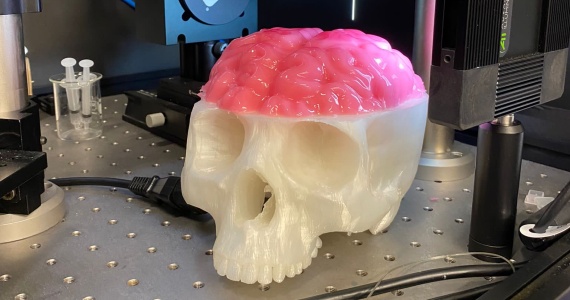IfM ‘Brain in a Box’ to feature at the Cambridge Festival

On Saturday 18th March, we open our doors at the Institute for Manufacturing for the 2023 Cambridge Festival. Among this year’s activities is a demonstration of research from the Fluids in Advanced Manufacturing (FIAM) group, featuring a jelly brain in a box!
Dr Niamh Fox and her colleagues in FIAM have spent the last few years working on the Interdisciplinary Research Collaboration (IRC) in Targeted Delivery of Hard-to-Treat Cancers, which is funded by the Engineering and Physical Sciences Research Council (EPSRC). The project brings together researchers from eight different universities and a variety of disciplines to discover more effective treatment methods for cancers with poor prognoses, specifically pancreatic cancer, mesothelioma, and glioblastoma (brain cancer). As part of that work, they have used the IfM roadmapping approach to optimise the process all the way from initial research to patient. Niamh explains:
"The IRC in Targeted Delivery for Hard-to-Treat Cancers focuses on designing new treatments for cancers that are hard to treat due to biological barriers put up by the body or the tumour itself."
These barriers look different for different cancers, and the experimental treatment research reflects that. Visitors to the IfM on Saturday will be able to explore how we watch the delivery of drugs into a fake, jelly brain. This demonstration is based on a real experiment built in the IfM to test a device that can be inserted into the brain to treat people with brain tumours, developed by Prof George Malliaras and PhD student Tobias Naegele in the Electrical Engineering Division of the Department of Engineering.
"The blood-brain barrier restricts large chemical species passing into the brain. This means that it is difficult to deliver enough of the drugs needed to the site of the tumour. Our project is designing new devices to deliver higher quantities of drugs directly to the site of the tumour," Niamh says.
The device is built to deliver drugs directly into the tumor site, and thereby to bypass this brain-specific obstacle to effective cancer treatment.
Because the gel that the phantom brain is made of roughly shares the mechanical properties of human brain tissue, Niamh and her team can use it to explore how the drugs might behave in the brain. To do this, they inject a dye into the phantom brain tissue and observe how it distributes, using the black box environment to control the amount of surrounding light. This allows them to test new possible forms of treatment in a controlled way before they move on to clinical testing on humans, which they hope to start soon.
The team recently published their research in a report which looks at the process of retrodialysis in greater detail and aims to describe how different conditions affect drug delivery.
About the Cambridge Festival
The Cambridge Festival is an annual event that brings research from across the University of Cambridge to the public, through in-person, on-demand, and online events. This year’s festival runs from 17th March to 2nd April, and the IfM will be open for visitors from 1pm to 5pm on 18th March.
Information about talks and activities at the IfM during the Cambridge Festival is available here:
https://www.ifm.eng.cam.ac.uk/events/cam-festival-ifm/










